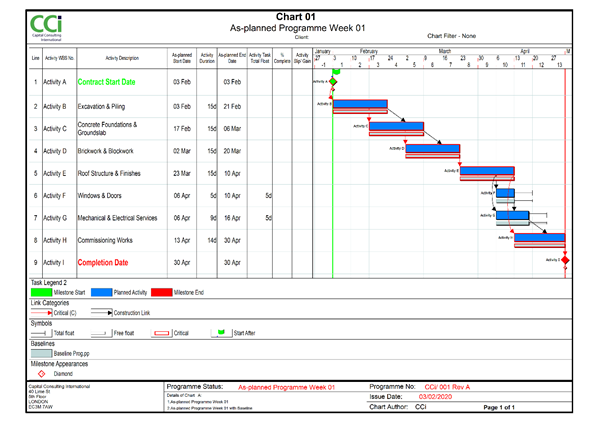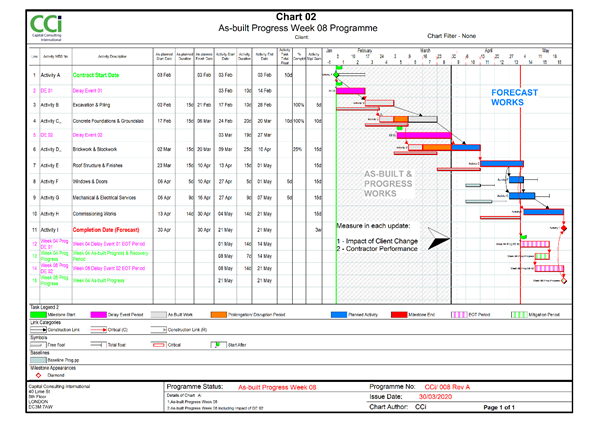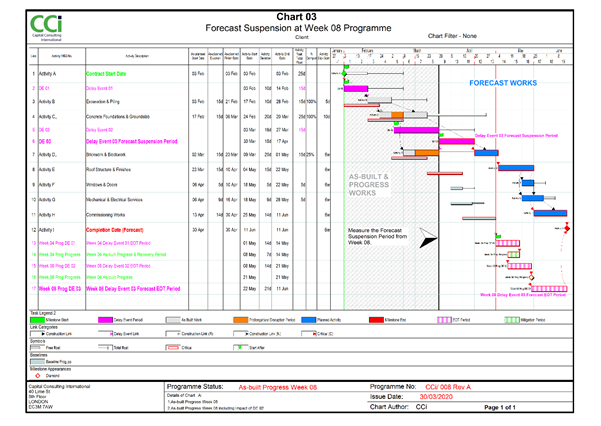Introduction
Whilst the government have issued “guidance ” – and to date the UK government has preferred guidance to mandatory restrictions. However, many projects have faced the reality that sites may be closed as a result of the current guidance and the potential impacts are:
Whilst the government have issued “guidance ” – and to date the UK government has preferred guidance to mandatory restrictions. However, many projects have faced the reality that sites may be closed as a result of the current guidance and the potential impacts are:
- Increasing welfare and hygiene facilities and protecting the workforce.
- Liaising with clients on contingency arrangements.
- Reviewing contractual arrangements to understand options now and in the future.
- Liaising with funders and banks to secure sufficient credit.
- Arrangements for delaying payment of taxes.
- Setting up project-specific communication networks with their supply chains.
- Reviewing safety-critical elements of their projects.
- Reviewing programmes.
- Ensuring remote access is in place.
- Offering those with the ability to work from home to do so.
- Protecting business-critical functions such as payroll and accounts departments.
- Splitting teams to avoid everyone becoming ill at the same time.
- Reducing contact between leadership teams.
All of these measures have some time and fundamentally cost impacts and have to be thought about and planned into your programme of work.
Before any step is finally realised, it may be worth considering the contract and practical application of some measures that will avoid or limit your exposure to some or all parts of that time and resultant cost impart. There may be a number of remedies under your contract that can be used to grant relief from performance if the coronavirus has an adverse impact on any of your construction projects. However, it will very much depend upon the exact wording of the contract itself and the impact of the virus on the project and any other surrounding circumstances and issuing notice as conditional precedent will be important.
Matters to consider:
- Force Majeure
- Frustration
- Price escalation
- Currency fluctuations
- Insolvency
- Redundancies
- Effect of new work practice incorporating “social distancing”
- Suspension and termination
In simple terms, the three main contract terms under JCT, NEC and FIDIC can be put as detailed in the table below:
| CONTRACT | FORCE MAJEURE | TIME | COSTS |
| JCT | Clause 2.26.14: force majeure is not defined although civil commotion, strike etc are listed separately as a Relevant Event. | Clause 2.25: extension of time where the works or a section are likely to be delayed beyond the relevant completion date by a "Relevant Event". | N/A as force majeure is not a Relevant Matter. |
| NEC | Clause 60.19: an unforeseeable event which neither party could prevent that stops the contractor completing the works. | Clause 60.1: both time and money can be awarded. | |
| FIDIC | Clauses 18.1 – 18.5 and 18.6: an "Exceptional Event" gives rise to potential rights to extensions of time and termination and either party may terminate the contract if it is impossible or unlawful to perform their contractual obligations. | Clauses 8.5 and 8.6: extensions of time are granted for delays caused by epidemics, governmental actions and authorities. | Clause 13.7: adjustments may be made in limited circumstances for increases in labour, goods, and other inputs into the works. |
| Clauses 13.1 – 13.3 and 13.6: Variations, Value Engineering and changes in law may give rise to both time and costs entitlements. | |||
Whilst we would avoid getting into the nuances of the law or specific bespoke changes of these contracts particular to your project, getting in any notices under the contract is always a preferred option.
Suspension
Once that decision is made, either jointly or by one of the parties to suspend the works and close the site, record the position up to that date with “as built records” such as the following: An up to date programme recording the project activities as follows:- The as-built start and finish of activities of the project to date
- The progress of the activities to date
- The remaining work activities rescheduled to record the completion date of the works and any key milestones
- Progress photos of the project to date detailing the state of the works
- The “Cut off” date of valuation of the works complete
If a Notice for Compensation Event under the NEC form of contract or similar notices under any other form is being issued, it may be prudent to include within the risk calculation for site remobilisation, new site inductions, a bottom up H&S audit etc. and a works survey to capture any interim deterioration in the works. Site security and Crane / Plant shutdowns will be similar to the Christmas protocols; exceptional cost will perhaps be new “social distancing” workforce practices and clean work protocols, which will impact productivity assumptions and performance that formed the contract sum.
It is important that should a suspension be agreed upon between the parties that the PM provides an assumption as per Clause 61 .6 of the NEC contract.
It is also important that the Contractor within the protocol of the NEC Contract, having impacted a forecast suspension period, also revisit his Time Risk Allowances on the remaining forecasted works to ensure that any future TRA is either reduced or increased depending upon the circumstances related to the compensation event as detailed at Clause 63.6 when assessing a CE.
Below are three charts that show the sequence of planning needed to record the movement of the Completion Date. These charts are not specific to any particular form of contract, but capture the following three elements:
- Impact of Change brought about by a Clients Variation
- The Contractors Performance recording as-built start and end dates and progress
- The Recovery due to better performance or mitigation by re-sequencing the forecast works
CHART 01 – Shows the As-planned Programme Week 01 works sequence. The baseline is shown by the thin grey bar underneath the activity:

CHART 02 – Shows the recorded facts up to Week 08 recording at the bottom of the chart the movement to the Completion Date due to the Impact of change, Contractor Performance and Recovery / Mitigation. The baseline of the As-planned programme is shown by the thin grey bar underneath the activity. The as-built section of the programme is greyed out (being in the past) and is to the left of the Progress Date line shown by the vertical black line. The forecast remaining works are blue and to the right of the Progress Date line:

CHART 03 – Shows from Week 08 the Impact of Delay Event 03 Forecast Suspension (Line 6) based upon an assumption agreed between the parties and recording the Extension of Time (line 17). The baseline of the As-planned programme is shown by the thin grey bar underneath the activity:

In following these steps, the parties are able to agree and understand the projects development while dealing with the principles of Impact of Change, Contractor’s Performance and Recovery / mitigation by resequencing the forecast works.
Notices
Where the performance of the contract is still possible despite COVID-19, there may still be time and cost impacts that will need to be assessed and allocated between the parties.
Under the JCT contract, the contractor is entitled to an extension of time where completion of the works or a section is likely to be delayed beyond the relevant completion date by a “Relevant Event”. The list of Relevant Events does not expressly include global virus outbreaks such as COVID-19. As mentioned above, force majeure is listed as a Relevant Event so the contractor may be able to claim additional time in respect of delays caused by COVID-19, subject to the factual assessment and mitigation factors. In addition to force majeure, Relevant Events include:
“the exercise after the Base Date by the United Kingdom Government … of any statutory power…which directly affects the execution of the Works.“
Under the NEC contract, additional time and money are not treated separately but are instead assessed together as a “compensation event”. There are a number of potential compensation events that might arise as a result of COVID-19, including compensation events for a failure by the client to provide something in time. In particular, clause 60.19 provides that there will be a compensation event when an event occurs which:
“stops the contractor completing the whole of the works or stops the contractor completing the whole of the works by the date for planned Completion showing on the Accepted Programme and which neither Party could prevent, an experienced contractor would have judged at the Contract Date to have such a small chance of occurring that it would have been unreasonable to have allowed for it.“
This provision may entitle the contractor to additional time and / or money as a result of the impact of COVID-19 on the works in the event of, for example, the need to self-isolate a material part of the workforce or the lack of materials as a result of shortages caused by the virus.
Government legislation can only be a compensation event if Option X2 (Changes in the Law) has been selected. If so, a change in the law of the country in which the site is located will be a compensation event if it occurs after the date of the contract.
Clause 61.3 proscribes a strict 8-week time period for the contractor to notify the project manager of the compensation event, otherwise the claim for a compensation event will be invalid and you lose entitlement to time or money.
This should be considered alongside the contractor’s ongoing obligation to give an early warning of matters which could increase the prices, delay completion or a key date, or impair performance of the works in use (clause 15.1). If the project manager decides that the contractor did not give an early warning which it could have, the project manager will assess the compensation event as if it had received an early warning, thus reducing the quantum of the compensation event in part or possibly entirely (clause 63.7).
Under the FIDIC contract, contractors are entitled to an extension of time for delays caused by:
“unforeseeable shortages in personnel or Goods… caused by epidemic or governmental actions“
Included with this, is unforeseeable delays caused by authorities. It is likely that either or both of these entitlements may be engaged by COVID-19. As for the recovery of both time and costs, “Variations” and “Value Engineering” proposals may be submitted by the respective parties to change the works if unforeseen circumstances arise and changes in law also give rise to an entitlement to time and cost (including changes in permits and licenses). In limited circumstances, adjustments for increases in labour, goods, and other inputs into the works may also be made.
Communication is vital
The fact that many of us are working from home at the moment, there is an opportunity to discuss these issues between the parties, to resolve problems that have already arisen and to plan solutions for future problems before they arise. Those kinds of discussions are to be encouraged, and when engaging in such discussions it will be important for the parties to keep the following points in mind:
- The contract is obviously crucial, and parties will need to protect their contractual positions, but it is unlikely to have all the answers.
- The current situation is not the fault of any party.
- The parties are ultimately likely to have to share the pain of this event in one form or another. How this is apportioned will be the crux of any negotiation.
- Parties may be able to get some relief from the government, and that should factor into commercial discussions and deals.
- Applying a sensible, co-operative and pragmatic outlook, parties may be able to avoid many of the disputes that might otherwise arise from this situation.
If you would like to seek further advice or would want a review taken specific to your project and the formal Contract, please get in touch either by:
Ian Gunton – Delay | ian.gunton@ccint.co.uk | +44 (0) 7958 267599


